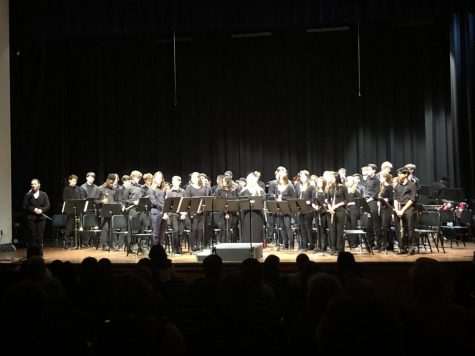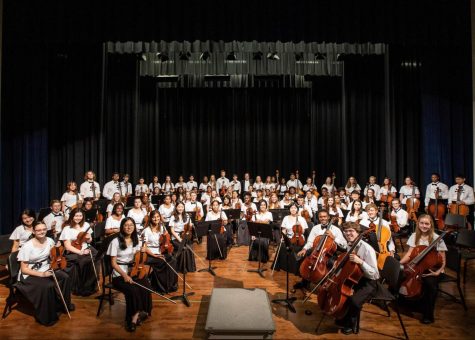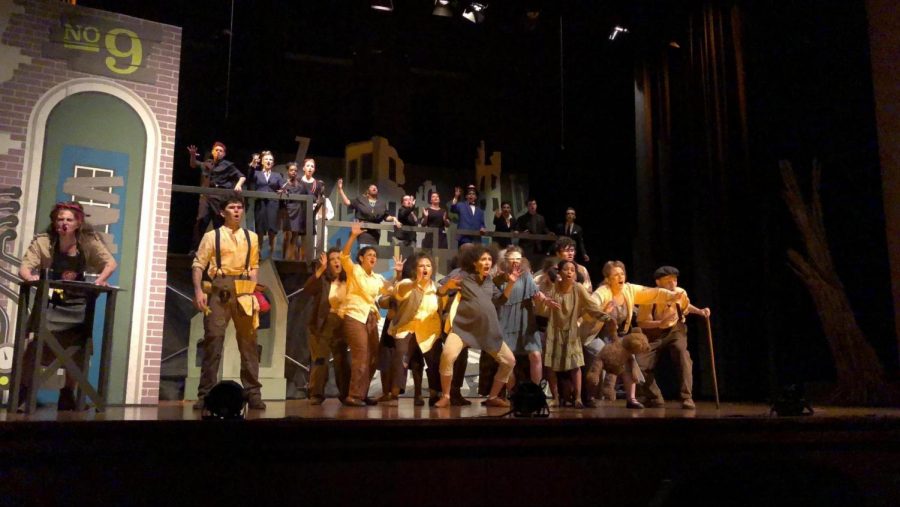Music and Theatre Department
Photo courtesy of Anna McKinzey.
Musical Theatre students performing in the 2019 musical, ‘Urinetown.’
January 13, 2020
Drama I
If you’re searching for the perfect elective to have a creative outlet, then look no further than Drama I.
“It’s really fun, and you get to find a sense of self,” said Aria Cates. “We do a lot of different acting exercises like mirroring and stuff like that.”
This class focuses on the “basics of acting” according to Katie Mogilski.
“You learn a lot about different styles of acting, how to approach the whole business and the history of it,” said Mogilski. “It’s just an overall fun and creative class.”
Students should be warned, though, that they will terribly upset if they sign up for this class thinking it will be a free period because participation is a huge factor in the grading system.
“You’re graded on participation every day. So if you raised your hand, you participated in the exercises, it’s mainly that,” said Cates. “If you participate, yeah, [it’s an easy A]. If you sit down on your phone every day it’s not gonna work out.”
Because of this, one should only sign up for this class if they have enthusiasm for the subject.
“I mean if you think you’re interested in theater, do it, but if you’re not interested in theater don’t do it as like an easy class because it’s a lot of stuff,” said Rosemary Cochran.
While it may be a lot of “stuff” the work is generally fun and engaging, with tasks ranging from “scenes and monologues” to improve.
This class is also a great way to meet other students who share the same interests.
“The best part of the class is meeting new people, bonding with them, and then performing with them,” said Lucy Samuels.
The course-load consists mainly of “memorization quizzes and mini-scene writings,” but it is nothing a dedicated student can’t handle, and by some was even described as “light.”
“It’s a perfect balance. I never worry about the class even with all my other core classes,” said Samuels. “You definitely have to put some hard work in, but it’s fun work!”
Musical Theater I
After Drama I, students can move to Musical Theater, a “very fun, creatively challenging class,” said Bridget Dowdakin, who selected this course because of her passion for the subject.
“I am so in love with singing and theater and I was like ‘Oh my gosh they have a musical theater class,’ so I was just very excited to dive into that,” said Dowdakin.
This course should only be recommended, though, to those with the same passion as Dowdakin.
“It you are into singing and dancing and acting then I would definitely recommend it to you,” said Phoenix Rosso. “If you think it’s maybe like an easy A or like an elective that you don’t have to try that hard in, I wouldn’t recommend it because it’s the total opposite.”
The reason for this is that musical theater students are required to participate in the fall One Act and the spring musical.
“You can sign up and be part of the crew if you don’t feel like you would like to be part of the cast, but everyone is required to participate in some way,” said Madeline Gregory.
The great part about this, though, is that the students are able to see a clear end result to their hard work.
“I think one of the best parts of the class is like watching the shows come together,” said Marion Holt.
But as long as students participate and complete their work in a timely manner, the class is “so manageable.”
“It’s a pretty easy class as long as your participate and show up,” said Gregory. “We do have assignments at the end of the year that if you don’t turn in it can affect your grade.”
Beginning Band

Band students show off their skills at a concert.
For those just beginning their music career, or continuing it from middle school, look no further than band class. Described by Mia Yeager as “fun yet educating,” this class is a great break in the middle of a stressful school day.
“It’s really fun because it’s kind of a break from all the APs and all the schoolwork we have to do,” said Ashika Srivastava. “Concerts are really nice. You go and play for all the parents and teachers. It’s a great way to relax.”
The grades for this class mainly consist of participation, but every two weeks the students have playing tests.
“My least favorite part is the assignments. We have playing tests every two weeks,” said Justin Smith. “They’re not super hard, you just have to practice.”
For Yeager the amount of playing tests is “just right” for this type of class.
If a student has never touched an instrument before in their life, this class is still open, and even suggested for them.
“There are a lot of kids in ninth grade that just got put in the class, and they just took up an instrument and they love it. They’re advancing now. It’s really easy to learn,” said Srivastava. “But if you’re not committed, then don’t do it because it’s really like a four-year commitment. It’s like a waste if you drop out.”
For those that play any percussion instrument, though, they are actually in a separate class: Intro to Musical Ensemble.
“It’s exactly like a band class except only percussion,” said Emma Marinkovic. “We do all the same things, it’s just based on percussion.”
If a student is willing to practice and prepare for playing test, then they should do just fine in this class.
“If you do all your work- which is not a lot- and participate than it is a very easy A,” said Yeager.
AP Music Theory
For students that have a love for music and want to understand the logic that goes into composition, AP Music Theory might just be the perfect class because students, as described by Kendall Young, get to “[learn] the fundamentals of how music is written and how to analyze written music in the best way possible.” The class focuses mainly on composition rules, but also the exemptions to these rules, and “why and how they [composers] deviate from these standards.” As a project the students get to show off their newly acquired knowledge by composing their own original piece.
The students that chose to take this class generally had a long history already with music. For example, Nicholas Osselette took it because he “wanted to better my knowledge,” whereas Samantha Hopper wanted the chance to take a class that would be different from the rest of her schedule.
“I knew that I wasn’t going to get a lot of opportunities in the future to get to just learn something that was interesting to me,” said Hopper.
The general consensus of students in the class is that you should only take this class if you are willing to put in the work.
“If you’re considering the class then I would take it because it’s like a good way to expand your knowledge of music so you can sound better while playing,” said Kendall Young. “But if you just want to take it for your friends that are in it then don’t do it because it’ll be really hard, and you won’t like it.”
There is a lot of work for the class and can take up a lot of time in the afternoon.
“I would recommend it to people with very light workloads who have lots of time to dedicate to the class because you have to work on it at least two hours a day, especially training your ear,” said Alexandra Jepson. “If you have perfect pitch, I’d take it but if you don’t, then I’d rethink it.”
The reason perfect pitch is helpful for this class is because they often have “oral quizzes” in which they must identify three chords being played for them.
While there are a lot of assignments that go along with this class, all that take it are happy that they did, and feel that getting an A is quite possible.
“I’d say it’s an easy A if you do you’re homework. If you don’t do your homework, you’re not gonna learn the content and it’s gonna suck,” said Hopper. “The 45% category is mostly completion work, so you’re homework, so it’s not that bad.”
Orchestra

The orchestra in concert.
For students looking to continue their strings education, orchestra is the class for you. Generally, freshmen take intermediate orchestra while sophomores, juniors, and seniors take advanced orchestra. Despite the division, the classes are really only separated by the level of music that the two orchestras play with music played by the intermediate orchestra being slightly easier.
Overall, orchestra is a pretty relaxed class and is relatively easy to get an A in. According to students the only homework you will ever have is to practice. That said, there are concerts and playing tests throughout the year. The relaxed nature of the class goes away around concert time, however.
“When we get close to concerts it’s really stressful because sometimes it feels like we’re not ready for concerts,” said Samantha McCrery. “We always pull through [sic], but it does get stressful.”
Unlike many classes at Chamblee, orchestra really feels like a close group of people, especially because the same people are usually in it each year.
“[Orchestra] feels like family,” said Meena Amiri. “Because everyone’s so open with each other and we don’t judge each other based on how we play. Everyone wants to help each other out, making sure everyone sounds better.”












